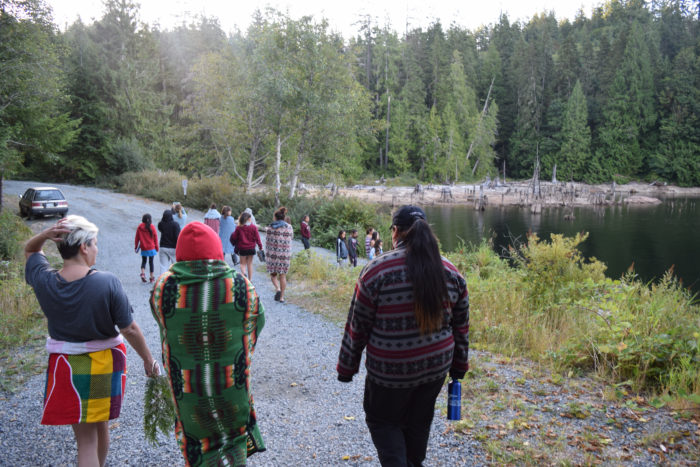Moving forward with delicate balance as summer gatherings cancelled
Above: NmTC hosted a youth gathering at Tla’amin in 2017. File photo.
By Skayu Louis
Summer is usually a time for our communities to gather and connect. However, this year, most of the annual events we have come to look forward to — canoe journeys, culture camps and more — have been postponed indefinitely. COVID-19 presents many uncertainties for future in-person gatherings in the 2020 season and beyond.
Though this physical separation is important in order to protect vulnerable community members, it brings a sense of loss for those of us who organize events. Our summer for IndigenEYEZ camps, youth gatherings, and facilitation have come to a swift pause as large gatherings remain an impossibility.
IndigenEYEZ is an organization, community, and growing network that brings together multiple nations for an annual week-long camp in the Syilx Okanagan Nation along the Smalqmix River. Our summer youth camps are aimed at forging connections between people of various Indigenous backgrounds — they are attended by youth from a variety of cultures, including Coast Salish, Okanagan, Tsilcotin and Dene.
Our camp events typically take place in early July and host between 50 to 80 people for a weeklong shared experience of creative engagement and land-based sensory activity. Our gatherings are rooted in the Indigenous knowledge, stories and languages of the spaces from which they are held. Activities range from smoking salmon along the river to hosting our annual shadow puppet storytelling event. Gatherings are often held in a temporary tipi village established for the purposes of our camps.
Our IndigenEYEZ family began to grow while being hosted in the traditional village site of the Smalqmix peoples, located on the Lower Similkameen Indian Band. The camp space and village site remind us through our smaymay — our oral histories — that pandemics in varying scales have swept through our territories in years past.
At the site of Ashnola, our story of Acxulaxw tells of a time when in the mid 1700s a sickness came through our valleys and impacted mostly adults, while sparing youth and elders into a scenario of famine. An Okanagan gathering party found the Smalqmix community in despair — our nations joined at that time permanently through sharing food and mutual aid. Strategies of distancing enabled the gathering party to take care of the Smalqmix community from summer into fall, and then through the rest of the year. They ended up staying in the valley on a permanent basis, and our contemporary Smalqmix community can trace their lineages to that history of distinction and togetherness.
While this has been an important story to orient camp comers in past years into the space of the Smalqmix, its teachings have pronounced meaning as we enter a new era of this new global pandemic. We remember to take these measures seriously, even if it means cancelling programs, and important gatherings that are keystone in the resurgence of our youth.
For the foreseeable future, it seems difficult to host spaces and gatherings to create youth/elder relationships, mentorships, and fulfill intergenerational knowledge transmission. Yet it remains important that our youth have access to this knowledge for strategies of coping with all of the nuanced difficulties that this reconfigured pandemic reality has brought our communities, as well as, important medicinal knowledge that can strengthen our relationship with land and help promote a localized defense against virus transmission. We know Indigenous communities have been disproportionately impacted by COVID-19 and that our elders are especially vulnerable, at the same time. Our elders are the keepers of our knowledge, languages, and stories.
Many of our languages from the Coast Salish world into the Interior have been hard hit by the impacts of residential school, colonization, and past pandemics and regardless of the pandemic we are in an era that is critical for youth/elder knowledge transmission. As we look forward into future camp scenarios, it will be a very delicate balance of how to engage our knowledge keepers and youth simultaneously in a shared space given the risk of future waves of COVID-19.
The lived and embodied experiences that sharing space on the land offer cannot be replaced in digital format, but perhaps they can be adapted in the interim to assure our continued connections are in place. Much of Turtle Island have turned to programs like Zoom to continue business as usual, modified programming, language classes, and general community engagement — while this model cannot suffice in the long term, there may be opportunities to engage the community that we have cultivated.
As one of the hosts of our major summer camp gathering, I will continue to pitch our tipis to keep them alive through this season of stillness. We will continue to check in with our elders. We will continue to check in with the youth, and we will persist into the future with stories of resilience that another pandemic has come and gone.




